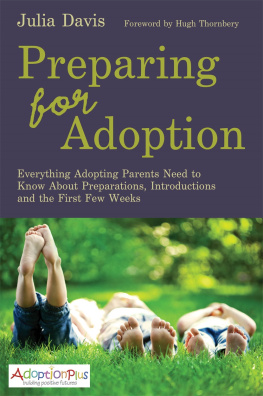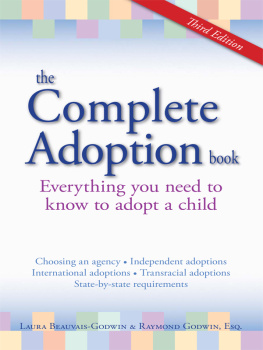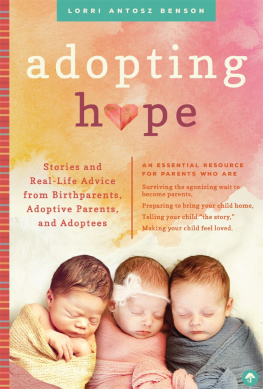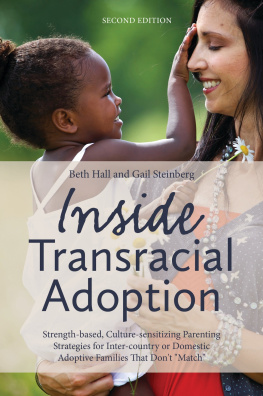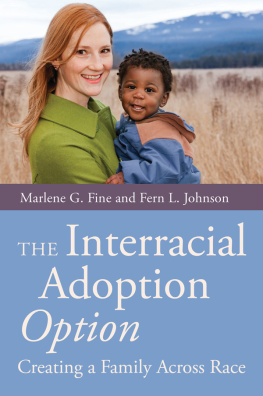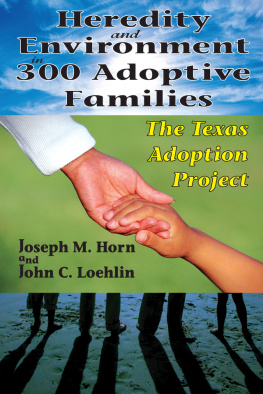
Preparing for Adoption
of related interest
Creating Loving Attachments
Parenting with PACE to Nurture Confidence and Security in the Troubled Child
Kim S. Golding and Daniel A. Hughes
ISBN 978 1 84905 227 6
eISBN 978 0 85700 470 3
Attaching in Adoption
Practical Tools for Todays Parents
Deborah D. Gray
ISBN 978 1 84905 890 2
eISBN 978 0 85700 606 6
No Matter What
An Adoptive Familys Story of Hope, Love and Healing
Sally Donovan
ISBN 978 1 84905 431 7
eISBN 978 0 85700 781 0
Adoption is a Family Affair!
What Relatives and Friends Must Know
Patricia Irwin Johnston
ISBN 978 1 84905 895 7
eISBN 978 0 85700 619 6
Reparenting the Child Who Hurts
A Guide to Healing Developmental Trauma and Attachments
Caroline Archer and Christine Gordon
ISBN 978 1 84905 263 4
eISBN 978 0 85700 568 7
Attachment in Common Sense and Doodles
A Practical Guide
Miriam Silver
ISBN 978 1 84905 314 3
eISBN 978 0 85700 624 0
Preparing for Adoption
Everything Adopting Parents Need to Know about Preparations, Introductions and the First Few Weeks
Julia Davis
Foreword by Hugh Thornbery

Jessica Kingsley Publishers
London and Philadelphia
First published in 2015
by Jessica Kingsley Publishers
73 Collier Street
London N1 9BE, UK
and
400 Market Street, Suite 400
Philadelphia, PA 19106, USA
www.jkp.com
Copyright Julia Davis 2015
Foreword copyright Hugh Thornbery 2015
Front cover image source: Shutterstock. The cover image is for illustrative purposes only, and any person featuring is a model.
All rights reserved. No part of this publication may be reproduced in any material form (including photocopying or storing it in any medium by electronic means and whether or not transiently or incidentally to some other use of this publication) without the written permission of the copyright owner except in accordance with the provisions of the Copyright, Designs and Patents Act 1988 or under the terms of a licence issued by the Copyright Licensing Agency Ltd, Saffron House, 610 Kirby Street, London EC1N 8TS. Applications for the copyright owners written permission to reproduce any part of this publication should be addressed to the publisher.
Warning: The doing of an unauthorised act in relation to a copyright work may result in both a civil claim for damages and criminal prosecution.
Library of Congress Cataloging in Publication Data
Davis, Julia, 1962
Preparing for adoption : everything adopting parents need to know about preparations, introductions and the first few weeks / Julia Davis ; foreword by Hugh Thornbery.
pages cm
Includes bibliographical references and index.
ISBN 978-1-84905-456-0 (alk. paper)
1. Adoption--Psychological aspects. 2. Adoptive parents. I. Title.
HV875.D353 2014
649.145--dc23
2014013585
British Library Cataloguing in Publication Data
A CIP catalogue record for this book is available from the British Library
ISBN 978 1 84905 456 0
eISBN 978 085700 831 2
For My Family
Contents
Foreword
This book is published at a significant time in the development of adoption in the UK. Each of the four constituent nations is addressing issues of adoption and permanence and while the focus of reform varies from nation to nation, the consistent underpinning driver is to ensure that children who can no longer live with their birth parents are found the right form of permanence as quickly as possible. Permanence can take many forms, and we have seen the development of different legal options over the last decade or so. Policy makers are quick to state that there is no hierarchy of preferred permanence options, and only the minority of children who enter the care system will end up being adopted, but there is no denying that an adoption order is a significant and hugely important transition in a childs life legally transferring, forever, all the rights and responsibilities formerly held by the birth parents to the adoptive parents.
I believe that adoption is transformative for children. It provides a security and locus for life for the child. In the UK, the majority of adopted children are adopted from care. Over two-thirds of these children will have experienced traumatic starts to their lives before their entry into care. Some will have experienced more than one foster placement before being adopted. None of them will have had the continuity of parenting, love and care that all children should and need to have.
That is why this book by Julia Davis is so important. It comes at a time when we are seeking to find more adoptive placements for children in care. Consequently, we are experiencing changes to the law, regulations, processes and structures to support that ambition. In all of this change though, some things remain constant, and while the processes that prospective adopters go through have developed over time, the basic stages of consideration, preparation and decision-making have remained the same. Getting it right from the beginning is so important and this is where this book comes in.
Prospective adopters come to a decision to adopt through different motivations but all have to face the same fundamental issues of preparation. We know from recent research in England that the experience and issues faced by individual adoptive families will vary in nature and intensity: some adoptions will be plain sailing, others will be, at times, highly challenging. In all cases the greater the level of preparation and knowledge, the better placed adoptive parents will be to deal with the joys and sometime challenges of adopting a child who has had a very difficult start in life.
There is a wealth of advice from adopters and professionals available to prospective adopters and there is a growing body of evidence from academic research. Navigating all of this can be difficult at times but this new book will provide a significant leg up for those looking for clear information, practical advice and links to the research evidence.
The book is broken down into chapters that take the reader from an understanding of attachment, loss and trauma and the impact of these experiences on the development of the childs brain through to different stages of the adopters preparation for the arrival of the child and the initial stages of placement. The strength of this book lies in its clear approach, setting out, at each stage of the process, what the adopter should know and expect, references to the relevant research, the roles and responsibilities of the professionals and excellent case studies that elaborate Julia Davis points.
All of this is presented in a way that does not minimise the challenge that some adopters may face. It comes from a deep professional understanding that adopters want and need the right information, at the right time, presented in a straightforward way with the right professional support alongside them. The author also understands the thirst that adopters have for reading around the subject and becoming experts in all aspects of attachment, trauma and therapeutic parenting. To this end the book concludes with a detailed Bibliography and a recommended childrens book list.
I believe that this book is a must-read for every prospective and new adopter: it is a good text for new entrants to adoption and fostering social work, and those with greater levels of knowledge will find it an invaluable reference resource. I hope you enjoy reading it as much as I did.
Next page
